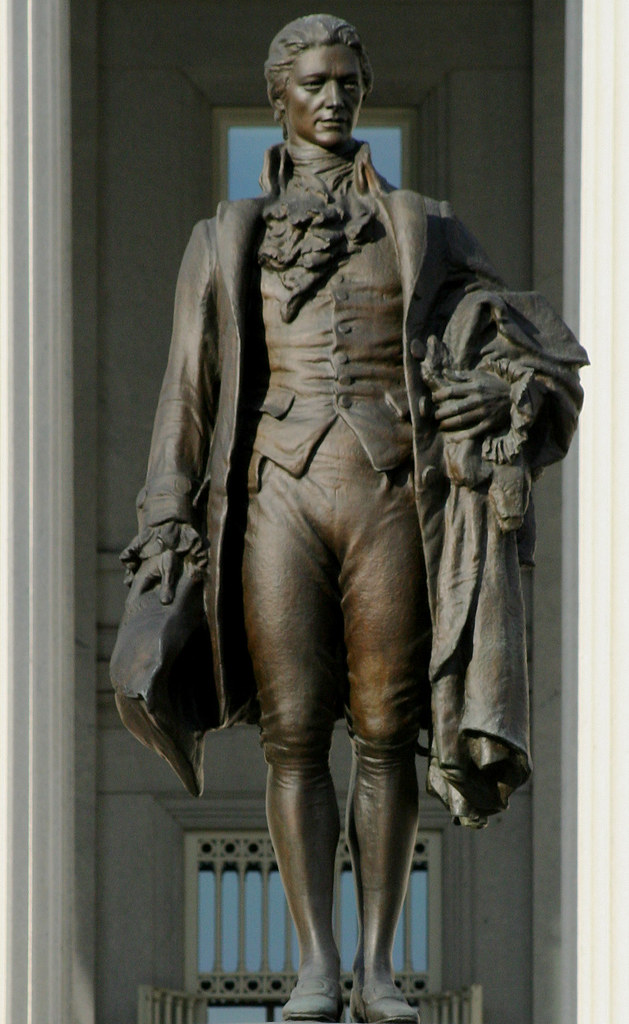Alexander Hamilton was a pivotal figure in the shaping of the United States. Born on the Caribbean island of Nevis, his early years were marked by hardship and loss, yet they forged a resilience and intellectual sharpness that would carry him far from his humble beginnings. His keen mind and drive for education brought him to the American colonies, where his involvement with the American Revolution set the stage for a distinguished and influential political career.
Hamilton’s role at the Constitutional Convention and as a co-author of the Federalist Papers established him as a formidable advocate for a strong federal government. As the first Secretary of the Treasury, his financial systems laid the groundwork for the American economy. Despite controversies and a career shadowed by personal and political conflicts, Hamilton’s legacy as a Founding Father is undeniable, casting a long shadow over the formation and early administration of the United States.
Key Takeaways
- Alexander Hamilton rose from early adversity to become a significant contributor to the birth of the United States.
- His advocacy and writings were crucial in forming the U.S. Constitution and the federal financial system.
- Hamilton’s legacy continues to influence American politics and economics long after his death.
Early Life and Education
Alexander Hamilton’s rise from humble beginnings to founding figure of America starts with his early life in Nevis and later in St. Croix, and his pursuit of education that prepared him for an influential career.
Birth and Childhood
Born on January 11 in the mid-1750s, Alexander Hamilton spent his early years on the island of Nevis in the British West Indies. His parents, Rachel Faucette and James Hamilton, were not married, which was a topic of social stigma at that time. Hamilton’s childhood faced additional turmoil, as his father left the family, and his mother passed away when Hamilton was around twelve years old. This left him and his brother orphaned in St. Croix.
- Nevis: Birthplace
- St. Croix: Subsequent upbringing
- Rachel Faucette: Mother (deceased in Hamilton’s childhood)
- James Hamilton: Father (left the family early on)
Education and Early Career
Remarkably self-motivated, Hamilton became a clerk at a local import-export firm, Beekman and Cruger, in St. Croix, which allowed him to exhibit his aptitude for business. His intelligence caught the attention of local businessmen who, after a devastating hurricane hit St. Croix, helped fund Hamilton’s education in New York. Hamilton later attended King’s College, now known as Columbia University, where he received an education that served as a cornerstone for his future successes in law and public service.
- Clerk: Early job at Beekman and Cruger
- Columbia University: Formerly King’s College, where Hamilton studied
- Hurricane: The event that led to Hamilton’s move to mainland America for better education opportunities
Political Achievements and Federalist Influence
Alexander Hamilton’s political achievements largely revolve around his substantial influence on federalist principles. He not only helped lay the foundational ideologies of the United States but also played a pivotal role in establishing the nation’s financial infrastructure.
Contribution to the Federalist Papers
Working closely with James Madison and John Jay, Hamilton co-authored a series of essays known as the Federalist Papers. These essays played a crucial role in the ratification of the U.S. Constitution by defending the idea of a strong central government. In these papers, Hamilton wrote extensively, authoring 51 out of 85 essays.
Role in the Founding of America
Hamilton’s drive for a unified nation under the Constitution marked him as a significant figure in America’s founding. As a New York delegate, he advocated for the Constitution, believing in the necessity of a central government to maintain unity and stability across the diverse states.
Tenure as Secretary of the Treasury
Appointed by President George Washington, Hamilton became the first Secretary of the Treasury. His tenure saw the establishment of the financial systems still in use today, including the First Bank of the United States and the Bank of New York, ensuring a stable economy for the burgeoning nation. His vision for a financially strong central government shaped the future of America’s economic policies.
Frequently Asked Questions
This section offers quick answers to common inquiries about Alexander Hamilton’s life and legacy.
What are the significant accomplishments of Alexander Hamilton?
Alexander Hamilton was a key figure in the founding of America, contributing as one of the authors of The Federalist Papers and serving as the first Secretary of the Treasury, where he established the nation’s financial system.
How did Alexander Hamilton contribute to the founding of the United States?
Hamilton played a vital role in the United States’ foundation by advocating for the Constitution’s ratification and writing 51 of the 85 essays in The Federalist Papers, which argued for a strong federal government.
What was Alexander Hamilton’s role in the creation of the US financial system?
As the first Secretary of the Treasury, Hamilton laid the groundwork for the modern financial system, including the establishment of a national bank, the creation of the U.S. Mint, and the implementation of taxes and tariffs to pay off the nation’s debts.
Can you outline the early life and upbringing of Alexander Hamilton?
Born in the Caribbean, Hamilton grew up in a challenging environment, which shaped his ambition and drive. He moved to New York to study, eventually joining the fight for American independence. His early life was marked by determination in the face of adversity.
What were the details surrounding the death of Alexander Hamilton?
Alexander Hamilton died from wounds he sustained in a duel with Aaron Burr on July 11, 1804. He was shot by Burr and passed away the following day, which was a tragic end to his influential life.
What impact did Alexander Hamilton’s ethnicity have on his life and career?
Although born out of wedlock and coming from a mixed ethnic background, Hamilton rose to prominence based on his intellect and capabilities. This aspect of his life often put him at odds with society’s expectations but he used his talents to overcome these hurdles.







